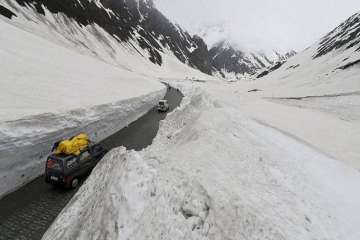Ladakhi tribe known for liberal customs struggling to preserve cultural legacy
The rich heritage of the Dard Aryans -- believed to be the original descendants of "pure Aryan race" -- is under threat due to rapid mordenisation, migration and religious conversion, experts say.
A tribe of Jammu and Kashmir's Ladakh region known for its liberal customs and ornate costumes is struggling to keep its vibrant cultural legacy alive and has requested the central government to make serious interventions.
The rich heritage of the Dard Aryans -- believed to be the original descendants of "pure Aryan race" -- is under threat due to rapid mordenisation, migration and religious conversion, experts say.
The Dard Aryans inhabit Dha, Hanu, Beema, Darchik and Garkone villages in Leh and Kargil districts. The villages are together called the Aryan valley.
The people of this region are completely different from those in other parts of Ladakh. They have unique physical features, social life, ethnic culture, and language. They consume the milk and meat of goat and sheep only and follow the solar calendar for festivals and agricultural activities, the experts say.
Many researchers believe that the "Aryans of Ladakh" or the "Brokpas" were part of Alexander's army and had come to the region over 2,000 years ago, an official of the Indira Gandhi National Centre for the Arts (IGNCA) says.
The tribe is considered "threatened" due to their depleting numbers, which, at present, is around 4,000. They are mainly dependent on agriculture and are "educationally and economically backward", he says.
The Dard Aryans do not document their history and they have carried forward their cultural legacy orally. Most of them have embraced Islam or Buddhism and modernisation has had a negative impact on their traditions, he claims.
Virendra Bangroo, a IGNCA scholar who has conducted extensive research on the tribe, says "Dard" is derived from a Sanskrit word, "Daradas", which means people who live on hillsides.
"The community prohibits marriage with outsiders to keep the gene pool intact. Of late, the Dard men have been migrating to other parts of the region (in search of livelihood) and marrying outside the tribe," he says.
The tribe has been struggling to find a balance between modernity and traditional values, Bangroo says.
Members of the tribe participating in a six-day festival, 'Arya Utsav', here say the tribe follows liberal customs and kissing in the public is considered normal.
Many people also believe the tribe indulges in the practices of polygamy and polyandry, but the members say such customs are a rarity now.
The community members claim there are only three high schools in their villages and very limited resources of livelihood -- mainly because of the harsh weather and difficult terrain. As such, they have no option but to migrate to cities for higher education and employment.
To deal with the problem, they say the government should set up a tribal hostel in the region and declare the Aryan valley a heritage village to boost tourism.
A delegation of the Dard Aryans also submitted a charter of demands to Minister of State for Tribal Affairs Sudarshan Bhagat on Friday.
"So far, the government has not been able to anything for the Dard Aryans. Its policies and programmes have failed to reach them. People in the mainland are generally oblivious to the tribe," Bangroo rues.
